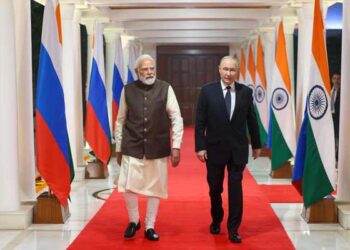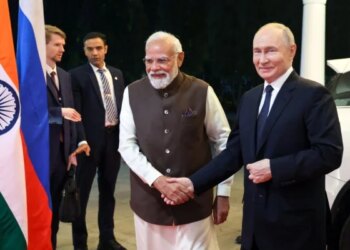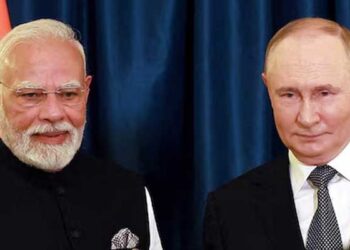Select Language:
- Russia claims U.S. report is intended to “increase tensions.”
- Moscow stresses the need for a diplomatic resolution to the Iran nuclear issue.
- Russia denies providing forceful support to Iran against Israel in June.
On Sunday, Russia’s foreign ministry dismissed claims that President Vladimir Putin had urged his Iranian ally to agree to a “zero enrichment” deal for its nuclear program, labeling the reports as “defamation.”
The U.S. news outlet Axios reported on Saturday that three anonymous sources alleged that Putin had encouraged Iran to strike a deal with the United States, preventing enrichment of uranium.
The Russian Ministry of Foreign Affairs responded that this article seems to be a deliberate political smear aimed at increasing hostilities surrounding Iran’s nuclear program.
In the statement, it emphasized, “We have consistently highlighted the importance of resolving the crisis concerning Iran’s nuclear ambitions through political and diplomatic means, and we are open to assisting in finding mutually agreeable solutions.”
Western nations and Israel suspect Tehran of attempting to produce an atomic bomb, a claim Iran denies, asserting its “non-negotiable” right to pursue a civilian nuclear initiative.
While Moscow maintains a friendly relations with Iran’s clerical regime, providing necessary support, it has not strongly backed its ally following the U.S.’s involvement in Israel’s bombing campaign in June.
Publicly, Moscow has asserted Tehran’s right to employ nuclear technology for civilian purposes, yet recently, Putin has also been seen fostering a closer relationship with U.S. President Donald Trump.
On June 13, Israel executed an unprecedented attack on Iran, igniting a 12-day conflict.
This escalation interrupted negotiations that had started in April between Tehran and Washington regarding the structure of Iran’s nuclear program in exchange for the easing of economic sanctions.
On June 22, the United States struck the underground uranium enrichment facility at Fordo, located south of Tehran, as well as nuclear sites in Isfahan and Natanz. The full scope of the damage remains unclear.







